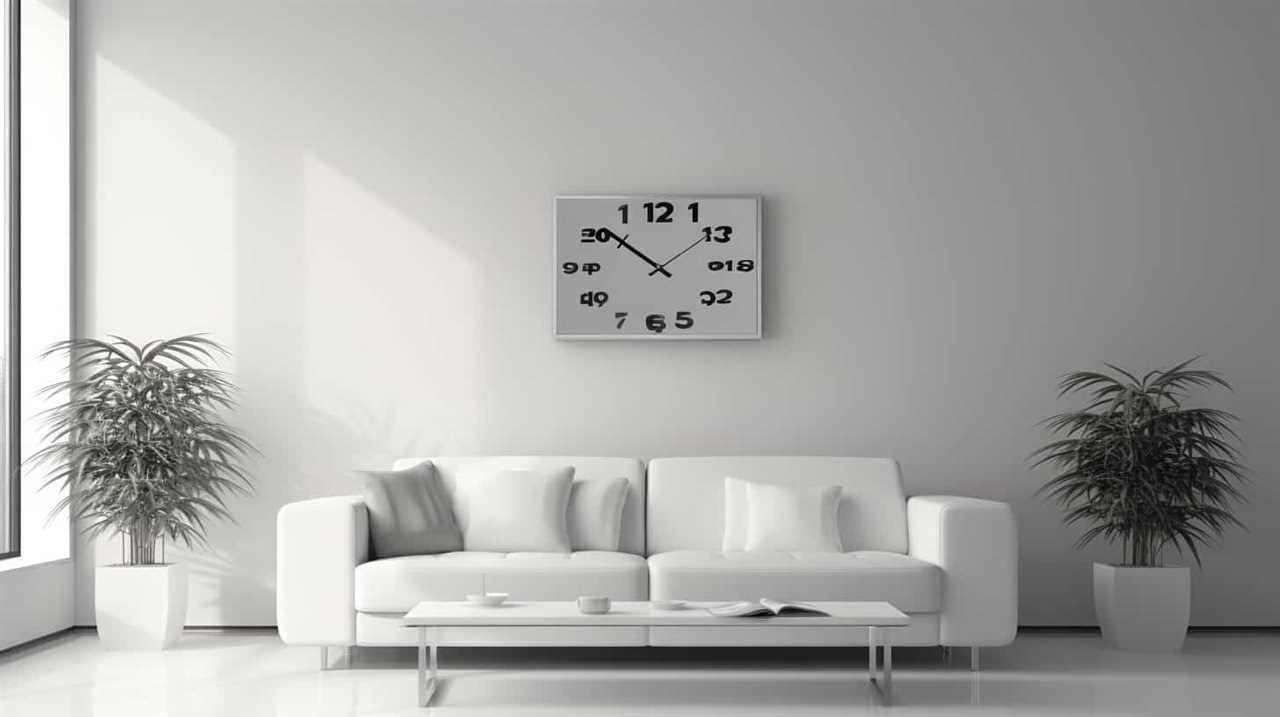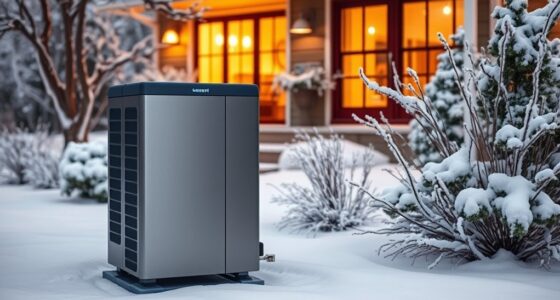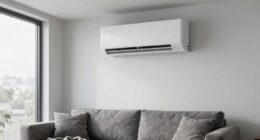Ready to transform your heating and cooling setup? Search no more – our detailed heat pump guide is here for you.
In this article, we will delve into the basics of heat pumps, explore different types of systems, and provide key factors to consider when choosing the perfect one for your home.
With our step-by-step instructions on installation and maintenance, you’ll be well-equipped to maximize energy efficiency and enjoy cost savings.
Get ready to embrace innovation and take control of your comfort.

Key Takeaways
- Heat pumps transfer heat by moving it instead of generating it, making them more energy-efficient than traditional heating and cooling systems.
- There are two main types of heat pump systems: geothermal heat pumps and air source heat pumps. Geothermal heat pumps are more efficient but more expensive to install, while air source heat pumps are more affordable and easier to install.
- When choosing a heat pump, it’s important to consider factors such as energy efficiency ratings, appropriate sizing for your space, and maintenance requirements.
- Heat pumps offer energy efficiency, cost savings, and environmental benefits by utilizing renewable energy sources, reducing reliance on fossil fuels, and reducing utility bills. Incentives and rebates are also available to help offset the initial cost of purchasing and installing a heat pump.
The Basics of Heat Pumps
We’ll start by explaining the basics of heat pumps.
Heat pump operation involves the transfer of heat from one location to another. Unlike traditional heating systems, which generate heat, heat pumps simply move heat from one place to another.
They work by utilizing a refrigerant that absorbs heat from the air, water, or ground and then transfers it to your home for heating purposes. This process can also be reversed to provide cooling during warmer months.
Heat pumps offer several benefits, including energy efficiency, cost savings, and environmental friendliness. By using the heat that already exists in the environment, heat pumps require less energy to operate compared to other heating systems. This results in lower utility bills and a reduced carbon footprint.

Types of Heat Pump Systems
There are various types of heat pump systems available in the market to suit different heating and cooling needs. Two popular options are geothermal heat pumps and air source heat pumps.
Geothermal heat pumps utilize the constant temperature of the earth to provide efficient heating and cooling. They extract heat from the ground during the winter and transfer it indoors, while in the summer, they remove heat from the indoor air and transfer it back into the ground.
On the other hand, air source heat pumps absorb heat from the outside air and transfer it indoors during the winter, and vice versa in the summer. These systems are more affordable and easier to install compared to geothermal heat pumps.
When choosing a heat pump, it’s important to consider factors such as energy efficiency, size, and noise level.

Factors to Consider When Choosing a Heat Pump
One important factor to consider when choosing a heat pump is the energy efficiency rating. This rating indicates how efficiently the heat pump consumes energy and can have a significant impact on your energy consumption and environmental footprint.
To help you make an informed decision, here are four key factors to consider:
-
Energy Consumption: Look for a heat pump with a high Seasonal Energy Efficiency Ratio (SEER) and Heating Seasonal Performance Factor (HSPF). These ratings indicate the efficiency of the heat pump in cooling and heating modes respectively.
-
Environmental Impact: Consider heat pumps that use environmentally friendly refrigerants, such as R-410A. These refrigerants have lower global warming potential compared to older refrigerants like R-22.

-
Size and Capacity: Ensure that the heat pump is appropriately sized for your space. An oversized or undersized heat pump can lead to inefficiency and discomfort.
-
Maintenance Requirements: Evaluate the maintenance requirements of the heat pump. Look for models that are easy to clean and have accessible filters for regular maintenance.
Installation and Maintenance of Heat Pumps
To ensure optimal performance and longevity, we recommend scheduling professional installation and regular maintenance for your heat pump. Proper installation is crucial to ensure that the heat pump operates efficiently and effectively. A professional technician will have the expertise to correctly install the unit and ensure all connections are secure. Regular maintenance is also essential to keep your heat pump in top shape. It involves tasks such as cleaning or replacing air filters, inspecting and cleaning coils, and checking refrigerant levels. Neglecting maintenance can lead to common heat pump issues such as reduced efficiency, inadequate heating or cooling, or even complete system failure. By addressing these issues promptly, you can avoid costly repairs and maintain the optimal performance of your heat pump.
| Common Heat Pump Issues | Potential Causes | Troubleshooting Steps |
|---|---|---|
| Insufficient heating | Low refrigerant levels | Check for leaks and recharge refrigerant if necessary |
| Dirty or blocked air filters | Clean or replace air filters | |
| Faulty thermostat | Calibrate or replace the thermostat | |
| Inadequate cooling | Dirty condenser coils | Clean the condenser coils |
| Inadequate airflow | Check and clean air vents, fans, and ductwork | |
| Refrigerant leak | Locate and repair the leak | |
| Noisy operation | Loose or worn-out components | Tighten or replace components |
| Faulty motor or fan | Repair or replace the motor or fan | |
| Improper installation or mounting | Reinstall or remount the heat pump properly |
Energy Efficiency and Cost Savings With Heat Pumps
We can achieve significant energy efficiency and cost savings with heat pumps. Here are four ways in which heat pumps provide energy efficiency benefits and financial advantages:

-
Lower energy consumption: Heat pumps are designed to transfer heat rather than generate it, making them more energy-efficient than traditional heating and cooling systems. This results in reduced energy consumption and lower utility bills.
-
Renewable energy source: Heat pumps can utilize renewable energy sources such as air, water, or the ground to provide heating and cooling. By harnessing these sustainable resources, heat pumps reduce reliance on fossil fuels and contribute to a greener future.
-
Incentives and rebates: Many governments and utility companies offer incentives and rebates for installing energy-efficient heat pumps. These financial incentives can help offset the initial cost of purchasing and installing a heat pump, providing additional cost savings.
-
Long-term savings: While heat pumps may have a higher upfront cost compared to traditional systems, the long-term savings in energy bills often outweigh this initial investment. Over time, the energy efficiency of heat pumps can result in significant financial savings.

Frequently Asked Questions
Are Heat Pumps Suitable for All Climates?
Yes, heat pumps are suitable for all climates. They offer high efficiency in both heating and cooling, making them a versatile option. Proper heat pump maintenance is crucial to ensure optimal performance and longevity.
Can Heat Pumps Be Used as the Sole Heating and Cooling System in a Home?
Yes, heat pumps can be used as the sole heating and cooling system in a home. They offer high heat pump efficiency and can help reduce the cost of heat pump installation.
What Is the Average Lifespan of a Heat Pump?
The average lifespan of a heat pump depends on various factors, such as maintenance requirements. Regular maintenance can extend the lifespan, ensuring optimum performance and efficiency. It is important to schedule regular inspections and cleanings to maximize the longevity of your heat pump.
Are Heat Pumps Noisy When Operating?
Yes, heat pumps can be noisy when operating. However, there are ways to reduce heat pump noise levels, such as proper installation, regular maintenance, and using noise-reducing features.

Can a Heat Pump Be Installed in an Existing Home Without Major Modifications?
Yes, a heat pump can be installed in an existing home without major modifications. Retrofitting homes with heat pumps involves assessing the existing HVAC system, making necessary adjustments, and installing the heat pump for efficient heating and cooling.
Conclusion
After exploring the comprehensive heat pump guide, it’s evident that these systems offer an efficient and cost-effective solution for heating and cooling needs.
With various types available, careful consideration of factors such as space, climate, and budget is essential.
Remember, heat pumps not only provide comfort but also contribute to environmental sustainability.

So, why wait? Dive into the world of heat pumps and embrace the warmth they bring, turning your home into a cozy haven.









